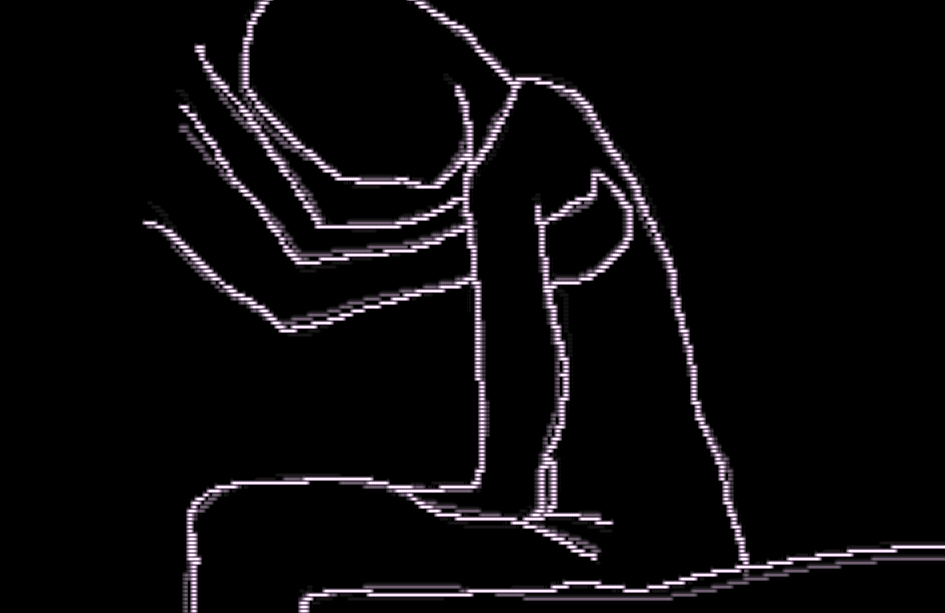A videogame that captures a son’s final moments with his dying father

Stephen Lawrence Clark is a videogame designer, musician, and co-curator of Babycastles. He is also a son—a loving one, who cared for his father in his final months battling ALS. On March 20, 2015, Lawrence passed away, leaving Stephen behind with broken rituals and abstract visual echoes of his absence. One June 21, 2015, Stephen created Lawrence, a small freeware game (or digital comic) made from what remained of his father.
When you watch a loved one disintegrate into illness, you don’t remember the things you’re supposed to remember. Or, at least, the most vivid memories that survive in the aftermath seem somehow inconsequential in retrospect. You don’t remember the story they told about their first airplane ride. But you do remember the rustle of their clothing, as you hugged them awkwardly in their bundle of sterile sheets. What feels most real in your mind is how their body used to take up space: old, hunched over, thin. And how, now, their body takes up even less space.
The crude drawings of Lawrence, in tandem with a soundtrack made up entirely of tactile noises, result in an experience of intimacy and silence not often seen in videogames. What follows is an interview with the creator, on how he managed to translate his loss into art.
///
KS: How did the art style emerge?
The day after my dad died, I just started making these crummy mouse-drawings of everything. Up until then, most every day revolved around his schedule of needs, so it was maybe a way to continue that ritual a little. It was a difficult time but I wasn’t really ready to stop, you know? After I had a bunch of drawings I started reworking them visually in GameMaker and I wanted it to look like a lot of little lights. There’s something comforting—to me—about being really close to a screen and seeing all the tiny lights that make up the image. It might have something to do with the CRT screens I grew up with, and sort of invoking that sense-memory for people who might also share it.

KS: How would you describe your father and your relationship with him?
He moved to north-east Russia in the late 90s and I’ve also moved around a lot the last 15 years—so I really only saw him once every few years, if that. When he was diagnosed with ALS and came back to the states, that’s probably the most regularly we ever hung out—at least since I was very young. He was thoughtful and meticulous, and always preferred to do everything himself. In many ways this particular disease was the worst thing that could have happened to him, because it ran completely counter to his personality and the way he wanted to live. It was oddly comfortable to be around him though because we both have this strange mixture of large quantities of patience but a very quick temper, so there was an underlying understanding to each others experience.
“That broke my heart every day.”
KS: What do you hope Lawrence captures about your experience?
I wanted a fair amount of frustration in the piece because it was really frustrating to not know what to do sometimes, and he wasn’t really able to give feedback most of the time. But I knew him, and I knew for sure that there was some specific way each thing, each movement, should be done—a best way, the way he’d do it—but I just couldn’t see it yet. He had little tricks for everything: filling up the coffee pot, opening packages, etc. The arrangement of every object was incredibly important: if a stool was moved he wouldn’t be able to drive his chair around it, or if a water bottle were a few inches off that would mean he couldn’t drink from it. He never got frustrated with me, and it wasn’t that I feared disappointing him, it was just the dance of trying to figure out how he would do something if he could do it. That broke my heart every day. He was never much of a talker, and ALS made it nearly impossible, so every word had to mean a bunch of words. I don’t usually like putting words in my videogames… so maybe I got my preference for non-verbal communication from him.

KS: What do you remember most from this experience? Any particular moment that stood out?
There were some fun or funny times that I wish I could have included in the game—one time he tricked my brother into coming really close so he could fart on him—but they wouldn’t have translated well. My dad always supported whatever I was interested in, and never pushed me to do something I didn’t want to do. I had a game nominated at IGF this year, and my dad and brother ate popcorn and watched the award ceremony online from his apartment. He was very proud of me and I’m awfully glad he got to see that.
KS: Was the process of making this game therapeutic or cathartic at all? If not, what did it feel like?
You know what, I don’t know yet. I went back and forth on whether or not to make it at all, a number of times. It was a compulsion that I followed, which is something I have learned to put faith in. In some ways I feel worse now than I did when I was working on it, because at least then I still had it—I could plink around with it for a bit and it was part of my day. Especially with personal work, though, you simply can’t know when you’ll feel good about it. You just have to trust that the impulse was a healthy one!



